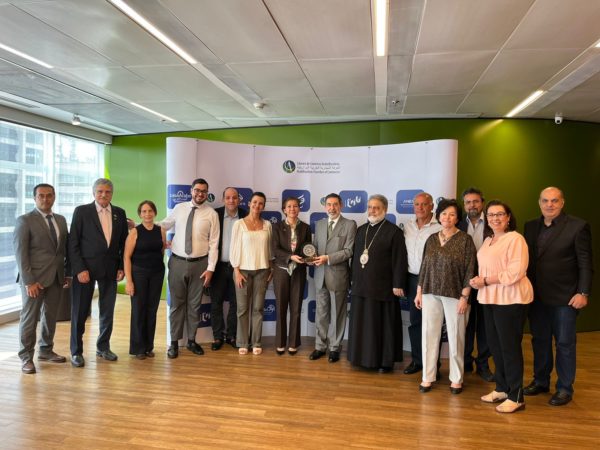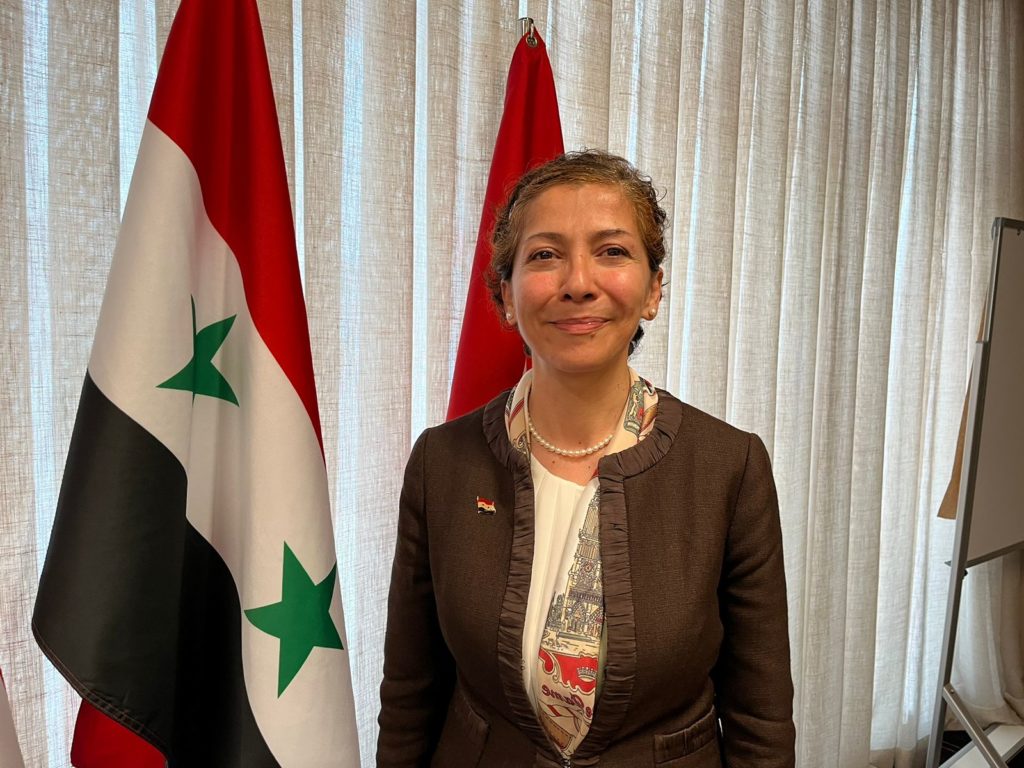São Paulo – The new Syrian ambassador to Brasília, Rania Al Haj Ali, visited the headquarters of the Arab Brazilian Chamber of Commerce (ABCC) in São Paulo this Friday (24), where she met with the organization’s president, ambassador Osmar Chohfi, and had lunch with representatives of the Together for Syria [Juntos pela Síria] campaign, which will donate medical equipment and drugs to the Arab country.
In an interview with ANBA, Rania said her main goal in the country was to strengthen ties between Brazil and Syria in all sectors, economic, cultural, scientific, educational, and all areas in which the countries could collaborate.

This is her first post as an ambassador, and the diplomat is also the first female ambassador from Syria to take the position in Brasília. Rania Al Haj Ali arrived in Brazil in November 2022 and is expected to stay here for four years.
Rania was part of Syria’s permanent delegation to the United Nations (UN) in New York; worked as head of mission of the Syrian embassy in Tokyo, Japan; and Syria’s permanent mission to the UN in Geneva, Switzerland. From November 2021 to November 2022, she was director of the International Organizations department in Damascus, Syria, at the country’s Ministry of Foreign Affairs. She was the first woman to head the department.
Regarding humanitarian aid to Syria, the diplomat said Brazil is doing its part, both on behalf of the government and civil society with ties with Syria. “I wish this aid had arrived earlier because the earthquake was on February 6, but I understand there are legal and logistical issues, especially regarding medication,” she said.
She said the earthquake was a devastating natural disaster severely affecting four governorates, Aleppo, Hama, Idlib, and Latakia. “Hundreds of thousands of people were affected. Thousands are dead, but we don’t have an exact number. And over 300,000 people were displaced from their homes. That was before the second earthquake, now there could be more,” said the ambassador.

The diplomat said life in Syria had been greatly affected, and with scarce resources for years, long before the earthquake, due to unilateral sanctions that made accessing essential items from other countries difficult. “Unfortunately, sanctions affect humanitarian assistance; we received aid from some neighboring countries, Arab countries, friendly countries,” she said.
Syria lacks heavy machinery, such as bulldozers and hydraulic jacks, to remove rubble and search for the missing, Rania said. She said there is a shortage of fuel, medical supplies, drugs, food, hygiene items, clothes, blankets, and all things needed by displaced people who have lost everything they had.
Iraq, Algeria, and Iran were the first countries to send humanitarian aid to Syria. Also helped the United Arab Emirates, Saudi Arabia, Russia, China, Jordan, Tunisia, Egypt, Lebanon, Indonesia, India, Pakistan, Japan, and the United Nations and other NGOs. Brazil will send food, water purifiers, and medicine in the coming days. “Each country is helping according to its possibilities, and even countries are also suffering from other issues are helping,” she said.
Turkey is receiving aid from over 100 countries. “I understand the suffering in Turkey, but they are receiving much more assistance than Syria. Of course, we sympathize with Turkey because we are in the same situation, but there they are not subject to a unilateral sanction, and they were not in a crisis for the last 12 years,” declared Rania.
Trade
Brazil exported about USD 17 million to Syria last year, 93% of which was coffee. Syria sold USD 3 million to Brazil, mainly in calcium phosphate fertilizer. “Our percentage is humble, and there was a decrease because [exports from Syria to Brazil] were much higher, especially before 2011. Entrepreneurs are cautious because they know about sanctions, but for me, nothing is impossible,” said Rania.
The ambassador said Syria has many opportunities for Brazilian companies, mainly in the infrastructure, energy, and natural gas reserves off the country’s coast. “There are many ways to bring back this trade; the potential exists. We need to rebuild our country, and I hope Brazilian businesspeople take part in this reconstruction and help trade to become more balanced,” declared the ambassador.
Translated by Elúsio Brasileiro




